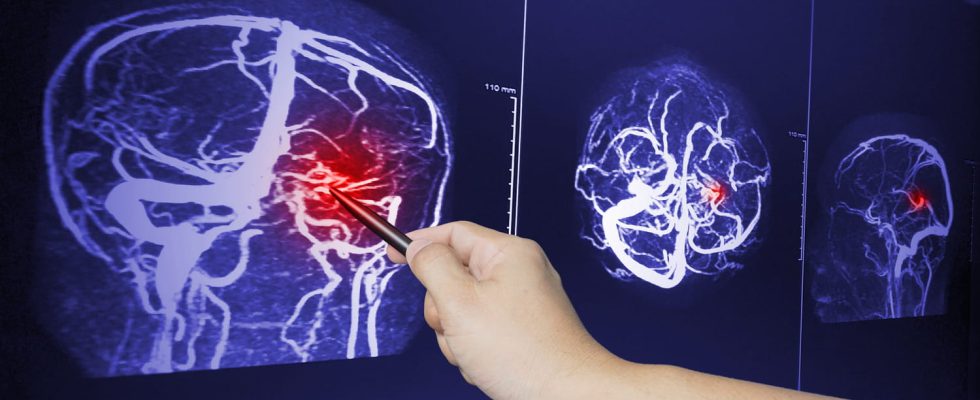A concussion is a head trauma that can cause various symptoms at the time but also several weeks or even years later. Athletes (rugby, boxing, etc.) are particularly confronted with it.
Definition: what is a concussion?
concussion cerebral is a shock-induced head trauma (head, face, neck) or “elsewhere in the body with a force transmitted to the head” specify the Regional Olympic and Sports Committee of Occitanie. She is responsible for symptoms and clinical signs of great variabilitywith or without loss of consciousness.
What are the symptoms of a concussion?
Very often in the acute phase, the concussion results in disturbances of consciousnessranging from the state of a “stunned” person to a loss of consciousness temporary, often of the order of a few seconds. The person may also have seizuresto have some disturbances of balance, visiona confusional state, a drowsiness and an feeling of being in the fog.
What late symptoms?
A set of symptoms called “post-concussion“can survive a few days to a few weeks later the accident. It is headache, dizziness, visual, hearing, taste or smell disturbances, fatigue, sleep disturbances. The patient may complain memory loss and difficulty concentrating. He may also exhibit a change in behavior with irritability, moodiness, anxiety, depression. He may also present with post-traumatic amnesia, i.e. forgetting of events usually less than 24 hours. “In rare cases, and even years after the occurrence of a head injury can occur epileptic seizures which will imperatively require a new consultation to set up a treatment“, informs Dr. Muriel Laffon neurologist.
What are the sequelae after a concussion?
In most cases, an isolated concussion is not seriousAnd no brain damage is caused by this trauma. However, if the blow received is very violent, it can cause a cerebral edema or hematoma (sub-dural or extra-dural) which may require surgical management. But even with mild head trauma, approximately 20% of patients will present a lasting complaint with a potential impact on socio-professional life. According to Dr. Muriel Laffon “THE poor prognostic factors are: one age over 40, a low level of education, prolonged disturbance of consciousness in the acute phase and long post-traumatic amnesia, the existence of pre-existing health problems, particularly neurologically“.
Concussion and Rugby
A special case concerns repeated concussions which can occur in certain sportsmen such as boxers and rugby players. These patients may present with memory problems or even dementia, progressively onset psychiatric disorders and gait and movement disorders which resemble the symptoms of Parkinson’s disease.
Post traumatic stress or concussion?
“Post traumatic stress disorder can be difficult to differentiate post-concussion syndrome, explains Dr. Muriel Laffon, the two can also be combined. It is a persistent psychological reaction following a traumatic event.“This state of post traumatic stress can also be the cause of memory loss, change in mood, sleep disorder… The treatment of post traumatic stress is based on psychotherapeutic care.
What causes a concussion?
Concussion is always the consequence of a blow, fall or strong jolt that transmits an impulsive force to the head. It is, for example, frequent in car accidents with a sudden stop, in certain “violent” sports such as rugby, boxing or hockey, or if a child is shaken too violently.
What to do in case of concussion? To consult ?
“In case of shock with loss of consciousness – whatever the duration – it is imperative consult the emergency department. A scanner will be carried out and monitoring in hospital will sometimes be necessary“explains Dr. Muriel Laffon. Away from the trauma, it is important to consult in case of memory problems or mood which may require the implementation of certain specific treatments such as drug treatment or rehabilitation. If epileptic seizures occur even years after the concussion, a doctor should be consulted.
What are the treatments for a concussion?
Most concussion patients recover in less than 3 months. It is often necessary to rest, both physically and intellectually, and a break from work is most of the time necessary. However 10 to 20% of patients will have a persistent physical, cognitive and psychological complaint, sometimes for several years. According to Dr. Muriel Laffon “early care by a neurologist, psychiatrist, psychologist is therefore important to put in place to limit the socio-professional impact on patients“.
Thanks to Dr Muriel Laffon neurologist epileptologist in Nice.
